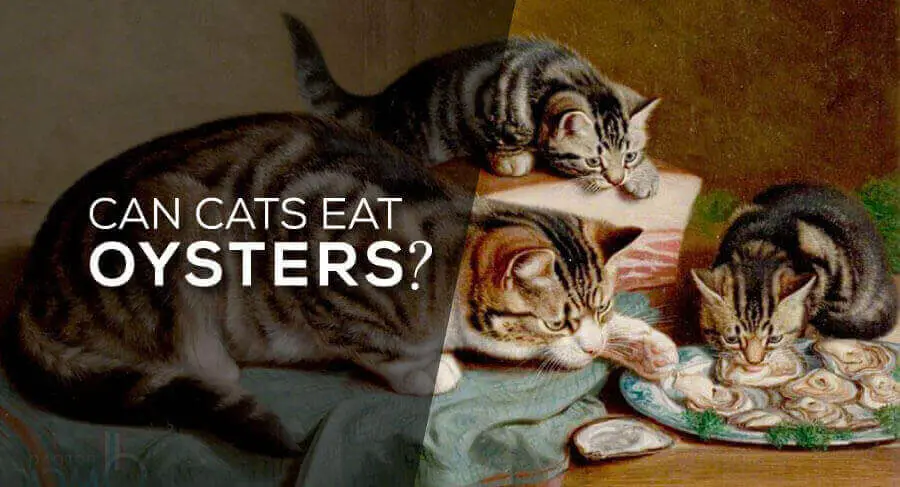Can Cats Eat Oysters?
What about our cat friends? Can cats eat oysters? The answer is yes, but with a few precautions.
Oysters are a good source of protein, zinc, and other minerals. They also contain omega-3 fatty acids, which are beneficial for both humans and cats. So it’s no surprise that some kitties go gaga over seafood!
However, you should only give your cat oysters as an occasional snack. Too much seafood can cause problems such as diarrhea or even liver damage. And remember to never give your cat raw oysters – they can contain harmful bacteria that could make your kitty sick.”
What are Oysters?
Oysters are a type of seafood that is often enjoyed as an appetizer or main course. They are low in calories and high in protein, making them a healthy option for those looking for something new to try. Oysters can be prepared in a variety of ways, so there is sure to be a recipe that suits your taste.
Oyster Nutrition Facts
Oysters are a type of shellfish that is low in calories and high in protein. A three-ounce serving of oysters contains only 73 calories and 17 grams of protein. Oysters are also a good source of zinc, vitamin B12, iron, and selenium. Selenium is an antioxidant mineral that helps protect cells from damage caused by free radicals. Oysters are also a good source of omega-3 fatty acids, which have anti-inflammatory properties and may help reduce the risk for heart disease.
Read More: Can Cats Eat Dates & Its Recipe?
What about Canned Oysters for Cats?
Canned oysters are a convenient and affordable way to enjoy this seafood favorite. But can cats have them?
The answer is yes, cats can eat canned oysters as long as they are boneless and properly cooked. Raw or undercooked oysters can contain harmful bacteria that may make your cat sick, so it’s important to take care when preparing them.
Canned oysters are a good source of protein, zinc, and other nutrients that cats need for good health. They also provide flavor and variety to your cat’s diet. So if you’re looking for a new way to spoil your feline friend, go ahead and give her a taste of the sea with some canned oysters!

Raw Oyster Bacteria
Raw oysters are a delicacy enjoyed by many, but there is one danger you should be aware of before indulging: the risk of contracting a bacterial infection.
Oysters can be contaminated with bacteria such as Vibrio vulnificus and Vibrio parahaemolyticus, which can cause serious illness. These bacteria are most commonly found in coastal waters and estuaries where oysters grow. They can also contaminate shellfish during harvesting, handling, or storage.
People who eat raw oysters are at risk of contracting these infections, but those with compromised immune systems are especially vulnerable. Symptoms of a bacterial infection include fever, chills, nausea, vomiting, and diarrhea. In severe cases, the infection can lead to sepsis (a potentially life-threatening condition caused by overwhelming inflammation), gangrene (tissue death), or even death.
If you choose to eat raw oysters it is important to take precautions to reduce your risk of exposure to these bacteria. Always purchase from reputable sources that follow safe food handling practices. Avoid eating any oysters that appear damaged or slimy and discard any shells that have been open for more than 30 minutes (this increases the chance that bacteria will enter the meat). Finally, always cook your oysters thoroughly – either steamed or boiled until they open – before consuming them.”
Read More: Best Cat Food to Prevent Vomiting?
Alternatives to Oysters for Cat Health
There are a number of different types of seafood that cats can enjoy in place of oysters Among the best substitutes are tinned tuna, sardines, and salmon. These fish are all high in protein and omega-3 fatty acids, which are important for cats’ overall health. They also contain minerals like zinc and selenium that help keep your cat’s coat healthy and shiny. In addition to seafood, there are a number of other types of meat that make good substitutes for oysters. Try feeding your cat chicken, beef, or lamb instead.
Oysters Aren’t All Bad
It’s no secret that oysters are a classic delicacy. But what you may not know is that they offer some pretty impressive health benefits, too.
For starters, oysters are packed with zinc and vitamin B12 – both of which are essential for energy production and maintaining a healthy immune system. They also contain high levels of selenium, which is beneficial for thyroid health and preventing cancer.
But the benefits don’t stop there! Oysters are low in calories and rich in protein, making them an ideal food choice for those looking to lose weight or maintain their current physique. Plus, their unique flavor makes them the perfect appetizer or main course for any occasion!
Benefits and Drawbacks to Cats Eating Oysters
There are many benefits and drawbacks to cats eating oysters. Some of the benefits include that oysters are a good source of protein, zinc, selenium, and omega-3 fatty acids. They also contain vitamins A, B12, C, D and E. Oysters can help keep your cat’s coat healthy and shiny due to their high levels of zinc.
However, there are some drawbacks to consider as well. For example, too much zinc can be toxic to cats so it is important not to give them too many oysters. Additionally, since oysters naturally filter water they can sometimes contain toxins or pollutants which may be harmful to cats if eaten in large quantities.
How do You Eat an Oyster?
How do you eat an oyster? It’s a question that has been asked for centuries, and the answer is still not entirely clear. There are many ways to enjoy this slippery little shellfish, but all of them involve getting that briny goodness into your mouth.
The most common way to eat an oyster is raw on the half shell. This involves shucking the oyster (removing its protective shell), discarding the top and bottom shells, and then slurping it down right out of the middle part. Some people like to add a squeeze of lemon or lime to enhance the flavor, but others believe that doing so masks the taste of the oyster itself.
If you’re not feeling quite so adventurous, you can also fry up some oysters in a pan with some butter or oil until they are nice and crispy. Or you could bake them in their shells with a bit of bread crumb topping – this gives them a bit more flavor than eating them raw. And if you really want to get crazy, there are recipes out there for stuffing whole cooked oysters with things like crabmeat or shrimp salad…yum!
What to Do If You Cat Ate Oysters?
If your cat ate oysters, there’s no need to panic. While it’s not necessarily harmful to cats to eat oysters, there are a few things you should do to make sure they’re okay.
First, check with your veterinarian to see if eating oysters are safe for cats. Some breeds of cats may be more sensitive to the toxins in shellfish than others. If your cat is allowed to eat oysters, make sure they’re cooked first. Raw or undercooked seafood can contain bacteria that can make your cat sick.
If you notice any signs of illness after your cat has eaten oysters, take them to the vet as soon as possible. Symptoms of shellfish poisoning in cats include vomiting, diarrhea, and lethargy. In severe cases, shellfish poisoning can lead to seizures and even death so it’s important not to take any chances if you think your pet might be ill from eating seafood.
Read More: Can Cats Drink Apple Juice?
Final Thought
Finally, can cats eat oysters? In answer to this question we can say that, if you’re a cat lover, you know that one of the things they love most is seafood. But even though cats crave oysters, they should be taken with precautions and moderation.
That’s because while a very tiny amount of oysters likely won’t have any serious negative consequences, eating them in large quantities can cause problems like intestinal blockages and poisoning. So if your cat loves seafood as much as ours does, make sure to give them only a small amount of oysters at a time – and preferably cooked ones!
FAQs – Can Cats Eat Oysters?
Whether your beloved cat can eat oysters or not, how to eat oysters etc. has been discussed above. Here are some common questions and answers about eating oysters in cats.
Can cats eat oyster sauce?
As a professional, you may be wondering if it’s safe to give your cat oyster sauce. The answer is yes, cats can eat oyster sauce safely but in moderation.
Oyster sauce is made from the essence of boiled oysters mixed with salt, sugar and thickener. It has a savory flavor and is used as a condiment in Asian cuisine. Oyster sauce contains high levels of sodium and phosphorus which are essential nutrients for cats. However, too much sodium can be harmful so it’s important not to overfeed your cat with this condiment. A little bit of oyster sauce added to their food will enhance their diet while providing them with some beneficial nutrients.
Can cats eat cooked oysters?
Cooked oysters are a seafood delicacy that many people enjoy. But can cats eat cooked oysters? The answer is yes, cooked oysters are safe for cats to eat.
Oysters are a good source of protein and omega-3 fatty acids, which are beneficial for cats’ health. They also contain zinc and selenium, which are important nutrients for felines. So if your cat enjoys seafood, cooked oysters make a healthy snack choice.
Can cats eat smoked oysters?
When it comes to seafood, most people think of things like shrimp, crab, and lobster. But what about oysters? Can cats eat smoked oysters?
The answer is yes, cats can eat smoked oysters. In fact, they’re a great source of protein and other nutrients that your cat needs. Just make sure to give them in moderation since they do contain a fair amount of sodium.
If you’re looking for a new way to feed your cat some seafood, try giving them smoked oysters. They’ll love the taste and you’ll be providing them with some important nutrients too!
Can a cat die of eating oysters?
Yes, a cat can die from eating oysters. Oysters are a type of shellfish that can contain harmful toxins that can be deadly to cats. Symptoms of oyster poisoning in cats include vomiting, diarrhea, seizures, and even death. If you think your cat has eaten oysters, contact your veterinarian immediately. You should be sincere when you offer what type of oysters to your cats.
Why should oysters never be given to cats?
When it comes to seafood, cats should never be given oysters. This is because oysters can contain a harmful bacteria called Vibrio vulnificus. If ingested by a cat, this bacteria can cause severe vomiting, diarrhea and even death. So if you’re ever out enjoying some fresh oysters and your cat begs for a bite, remember that they’re better off without them!
Can felines be given seafood every day?
Yes, cats can have seafood every day. In fact, it’s a good idea to give them a variety of different types of seafood so they get the nutrients they need. Some good options include salmon, tuna, shrimp, and crabmeat.
Read More: Can Cats Have Oat Milk?
Can kittens eat oysters?
Yes, kittens can eat oysters. In fact, they are a good source of protein and other nutrients that help kittens grow and develop. However, as with any food, you should always consult your veterinarian before feeding your kitten anything new to make sure it is safe for them to eat.
How many types of oysters are there?
There are hundreds of different types of Oysters found all over the world! However, not all Oysters are safe to eat- only those that live in clean waters should be consumed. The safest way to tell if an Oyster is edible is by its color- if it’s black or has red spots on it then it’s best avoided. If you’re unsure about whether or not an Oyster is safe then ask your local seafood vendor for advice before purchasing them.
Here are the questions and answers related to Can Cats Eat Oysters in the FAQ section.



